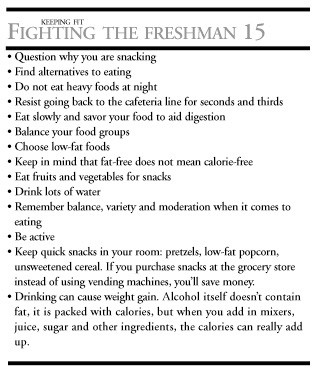
Prevent freshman 15
Every incoming college student has heard about it. It’s so pervasive, it’s reached mythic proportions. And they’re doing everything they can to avoid the “freshman 15.”
The term, which refers to the infamous 15 pounds a new college student supposedly puts on in their first-year of school, weighs heavy on the mind of every student trying to make the right eating decisions away from home.
Transitioning from high school to college can bring dramatic changes in a person’s lifestyle and habits because it is the first time he has been away from the watchful eyes of his parents. Weight gain can occur during this period due to drastic changes in a person’s eating and drinking pattern.
“Meal times in college become social times as well,” said Sue Duncan, a dietician for SMU Dining Services. “Students can spend hours in the cafeteria chatting and eating.”
Often, increased alcohol consumption in the university environment adds on more calories to a first-year’s diet.
In addition, students rushed for time often substitute junk food for meals, especially when their schedules get busy.
However, by making the right eating choices, first year’s can avoid the weight.
“It all comes down to how many calories you eat,” Duncan said. “Portion distortion is a huge reason for the ‘freshman 15.’ Students need to pay attention to the amount of food they are eating, not necessarily what they are eating.”
The key to eating healthy, Duncan said, is making wise food decisions: eating fresh fruits instead of canned fruit, eating wheat bread instead of white bread, and drinking skim milk instead of whole milk.
SMU Dining Services tries to cater to the health needs and requests of SMU students. Umphrey Lee Cafeteria is always stocked with fresh vegetables and fruits and healthy deli meats that are 98 percent fat-free. The cafeteria also allows students to choose the foods they want to eat as it is prepared before them.
For example, in Umphrey Lee’s Pasta Station, students have the option to direct the chefs in preparing their meals. For a healthier option, ask for no oil with your noodles and choose the marinara sauce over the alfredo.
“Students must realize that all foods can fit [into a healthy diet],” Duncan said. “They just need to follow the food guide pyramid. There is no reason for a person to deny themselves of something.”
SMU also offers students fitness labs to stay in shape. Options like step aerobics, kickboxing, combo aerobics, Tae-Bo and yoga can help increase heart rate and respiration, as well as tone muscles.
Irene Moore, aerobics coordinator at Dedman Center for Lifetime Sports and Exercise, recommends taking the kickboxing and step aerobics classes to maintain weight, the combo aerobics class for muscle toning, and the Tae-Bo to burn calories.
But as Tim Moore, associate director of recreation in the Dedman Center for Lifetime Sports, emphasizes, maintaining healthy weight is not a focus on one area, but rather an entire lifestyle program.
“Exercise at least three times a week for thirty minutes, do resistance training such as sit-ups, push-ups and weightlifting, eat a balanced diet and drink moderately,” Moore recommended.
But the best advice is to take everything in moderation.
As Duncan said, “You can have your cake, just not a lot of cake.”








